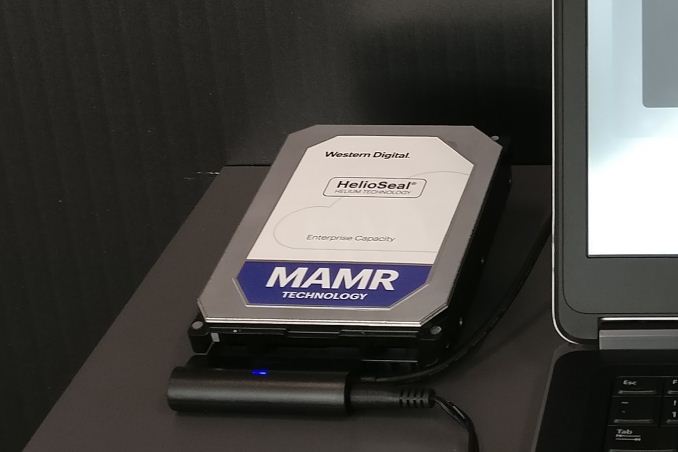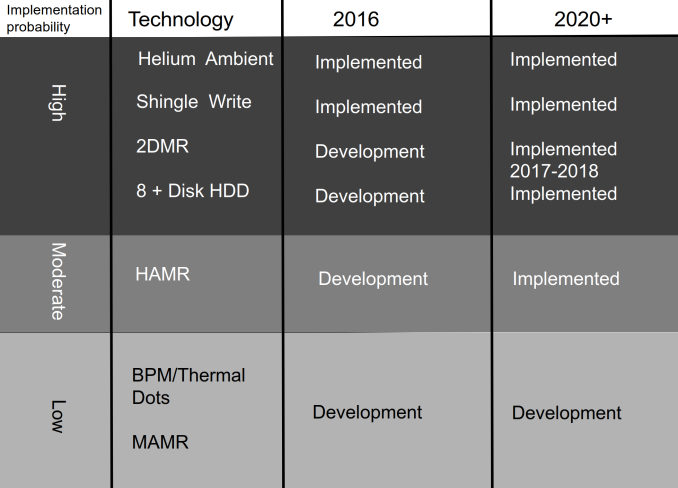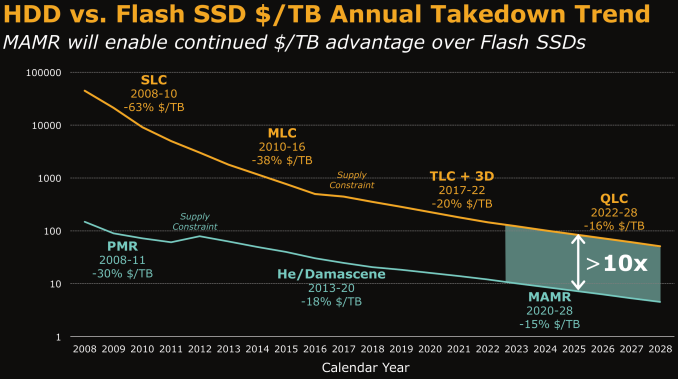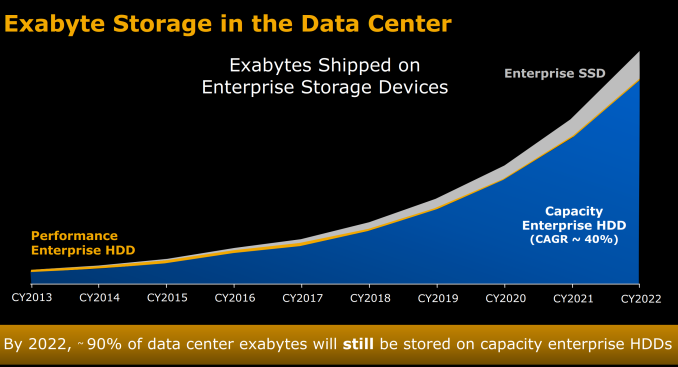Western Digital Stuns Storage Industry with MAMR Breakthrough for Next-Gen HDDs
by Ganesh T S on October 12, 2017 8:00 AM EST
Yesterday, Western Digital announced a breakthrough in microwave-assisted magnetic recording (MAMR) that completely took the storage industry by surprise. The takeaway was that Western Digital would be using MAMR instead of HAMR for driving up hard drive capacities over the next decade. Before going into the specifics, it is beneficial to have some background on the motivation behind MAMR.
Hard drives may be on the way out for client computing systems, but, they will continue to be the storage media of choice for datacenters. The Storage Networking Industry Association has the best resources for identifying trends in the hard drive industry. As recently as last year, heat-assisted magnetic recording (HAMR) was expected to be the technology update responsible for increasing hard drive capacities.

Slide Courtesy: Dr.Ed Grochowski's SNIA 2016 Storage Developer Conference Presentation
'The Magnetic Hard Disk Drive: Today’s Technical Status and Its Future' (Video, PDF)
Mechanical Hard Drives are Here to Stay
One of the common misconceptions amongst readers focused on consumer technology relates to flash / SSDs rendering HDDs obsolete. While using SSDs over HDDs is definitely true in the client computing ecosystem, it is different for bulk storage. Bulk storage in the data center, as well as the consumer market, will continue to rely on mechanical hard drives for the foreseeable future.
The main reason lies in the 'Cost per GB' metric.
Home consumers are currently looking at drives to hold 10 TB+ of data, while datacenters are looking to optimize their 'Total Cost of Ownership' (TCO) by cramming as many petabytes as possible in a single rack. This is particularly prevalant for cold storage and archival purposes, but can also expand to content delivery networks. Western Digital had a couple of slides in their launch presentation yesterday that point towards hard drives continuing to enjoy this advantage, thanks to MAMR being cost-effective.
Despite new HDD technology, advancements in solid state memory technology are running at a faster pace. As a result SSD technology and NAND Flash have ensured that performance enterprise HDDs will make up only a very minor part of the total storage capacity each year in the enterprise segment.
The projections presented by any vendor's internal research team always need to be taken with a grain of salt, but given that SanDisk is now a part of Western Digital the above market share numbers for different storage types seem entirely plausible.
In the next section, we take a look at advancements in hard drive technology over the last couple of decades. This will provide further technical context to the MAMR announcement from Western Digital.












127 Comments
View All Comments
Ranger1065 - Thursday, October 12, 2017 - link
Thanks for a very interesting article.bill.rookard - Thursday, October 12, 2017 - link
Agreed. Very cool stuff. I guess that the industry in general didn't want their hard drives 'with frikkin laser beams.' </dr.evil>dalewb - Friday, October 13, 2017 - link
Lol thanks for the laugh!BrokenCrayons - Thursday, October 12, 2017 - link
Interesting, but the news is disappointing. If this really does mean that HAMR is dead, that stinks. "It's MAMR time!" doesn't have the same ring to it so I'm still going to advocate the inferior, more expensive HAMR option.lmcd - Thursday, October 12, 2017 - link
If HAMR doesn't make a notable % marketshare, we can repurpose the acronym. Microwave-Assisted -> High frequency-Assisted.zoxo - Thursday, October 12, 2017 - link
ironically, microwave is orders of magnitude lower frequency than "heat"GoodRevrnd - Thursday, October 12, 2017 - link
But now you can load your data center with MAMRies.BrokenCrayons - Thursday, October 12, 2017 - link
This is logic I can't argue with. Long live the data center's MAMRies!milleron - Friday, October 13, 2017 - link
When these devices fail, have they gone tits up?boeush - Thursday, October 12, 2017 - link
It's all in how your pronounce it.For instance, I tend to favor "maimer" over "mah-mer"... ;-)